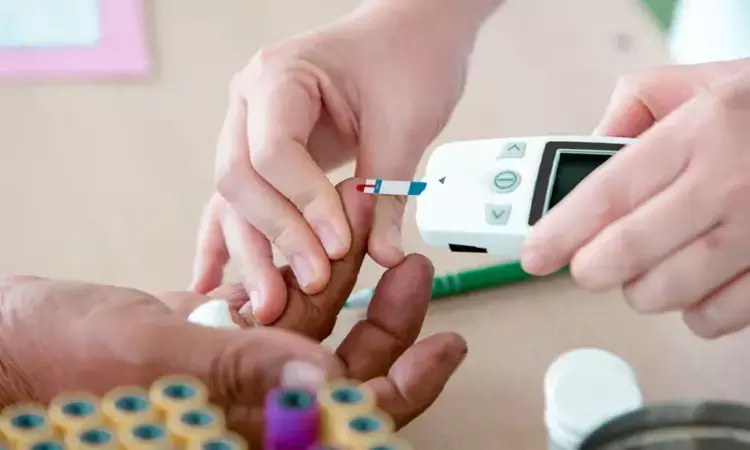- Home
- Medical news & Guidelines
- Anesthesiology
- Cardiology and CTVS
- Critical Care
- Dentistry
- Dermatology
- Diabetes and Endocrinology
- ENT
- Gastroenterology
- Medicine
- Nephrology
- Neurology
- Obstretics-Gynaecology
- Oncology
- Ophthalmology
- Orthopaedics
- Pediatrics-Neonatology
- Psychiatry
- Pulmonology
- Radiology
- Surgery
- Urology
- Laboratory Medicine
- Diet
- Nursing
- Paramedical
- Physiotherapy
- Health news
- Fact Check
- Bone Health Fact Check
- Brain Health Fact Check
- Cancer Related Fact Check
- Child Care Fact Check
- Dental and oral health fact check
- Diabetes and metabolic health fact check
- Diet and Nutrition Fact Check
- Eye and ENT Care Fact Check
- Fitness fact check
- Gut health fact check
- Heart health fact check
- Kidney health fact check
- Medical education fact check
- Men's health fact check
- Respiratory fact check
- Skin and hair care fact check
- Vaccine and Immunization fact check
- Women's health fact check
- AYUSH
- State News
- Andaman and Nicobar Islands
- Andhra Pradesh
- Arunachal Pradesh
- Assam
- Bihar
- Chandigarh
- Chattisgarh
- Dadra and Nagar Haveli
- Daman and Diu
- Delhi
- Goa
- Gujarat
- Haryana
- Himachal Pradesh
- Jammu & Kashmir
- Jharkhand
- Karnataka
- Kerala
- Ladakh
- Lakshadweep
- Madhya Pradesh
- Maharashtra
- Manipur
- Meghalaya
- Mizoram
- Nagaland
- Odisha
- Puducherry
- Punjab
- Rajasthan
- Sikkim
- Tamil Nadu
- Telangana
- Tripura
- Uttar Pradesh
- Uttrakhand
- West Bengal
- Medical Education
- Industry
Thyroid Dysfunction Tied to Elevated Hyperglycemia and Diabetes Risk in Women 20-49 Years: Study Finds

China: A nationwide population-based cohort study from China has revealed a significant link between thyroid dysfunction and the development of hyperglycemia in women of reproductive age. The study, published in Diabetes Research and Clinical Practice by Ying Yang and colleagues from the National Human Genetic Resource Center in Beijing, underscores the importance of incorporating thyroid monitoring into preconception care to reduce the risk of metabolic disorders such as diabetes mellitus (DM).
Researchers analyzed data from 339,259 Chinese women aged 20 to 49 years who participated in the Chinese National Free Prepregnancy Checkups program twice within three years, between 2010 and 2017. The aim was to estimate the incidence of hyperglycemia and assess its association with thyroid-stimulating hormone (TSH) levels.
Over the study period, 3,685 women developed diabetes, corresponding to an incidence rate of 0.37 per 100 person-years, while 8,954 participants were diagnosed with impaired fasting glucose (IFG), with an incidence rate of 0.90 per 100 person-years.
The following were the key findings of the study:
- Both abnormally low and high baseline TSH levels were linked to an increased risk of developing hyperglycemia.
- Women with TSH levels outside the normal range (0.37–4.88 mIU/L) had significantly higher rates of IFG and DM than those with normal TSH levels.
- Participants whose TSH levels shifted from normal to abnormal during follow-up faced a 47% higher risk of developing IFG.
- These individuals also had an 82% greater risk of progressing to diabetes compared to those with consistently normal TSH levels.
- The associations were supported by Cox proportional hazards models and validated using inverse probability of treatment weighting (IPTW) to control for confounding factors.
- A reverse J-shaped association was observed between TSH levels and hyperglycemia risk, suggesting that both hypothyroid and hyperthyroid states may contribute to blood glucose dysregulation.
Commenting on the findings, the authors noted, “In a large study of 339,259 women, both low and high TSH levels were linked to a higher risk of high blood sugar. Women with abnormal TSH had a 47% greater risk of developing impaired fasting glucose and an 82% higher risk of diabetes compared to those with normal TSH levels (0.37–4.88 mIU/L). The rates of IFG and diabetes were 0.90 and 0.37 per 100 person-years, respectively. The risk followed a reverse J-shaped pattern, meaning both low and high TSH levels increased the chances of hyperglycemia.”
The study authors emphasized the clinical relevance of these insights, particularly in the context of reproductive health and preconception planning. Since thyroid dysfunction may predispose women to glucose intolerance, early identification and targeted management could help reduce the risk of developing diabetes and related complications.
The large-scale nature of the study reinforces the need for integrated screening strategies that include thyroid function testing in women of childbearing age. Such an approach could facilitate early interventions and inform more effective healthcare policies to reduce the long-term burden of diabetes in this population.
Reference:
Yang, Y., Lyu, X., Fu, J., Lei, J., Wu, H., Zhao, C., Liu, M., Hu, X., Li, J., Wang, Y., He, Y., Peng, Z., Zhang, Y., Zhang, H., Wang, Q., Shen, H., Zhang, Y., Yan, D., Ma, X., . . . Guan, H. (2025). Incidental hyperglycemia in women at reproductive age and its association with thyrotropin levels: A population-based cohort study in China. Diabetes Research and Clinical Practice, 112345. https://doi.org/10.1016/j.diabres.2025.112345
Dr Kamal Kant Kohli-MBBS, DTCD- a chest specialist with more than 30 years of practice and a flair for writing clinical articles, Dr Kamal Kant Kohli joined Medical Dialogues as a Chief Editor of Medical News. Besides writing articles, as an editor, he proofreads and verifies all the medical content published on Medical Dialogues including those coming from journals, studies,medical conferences,guidelines etc. Email: drkohli@medicaldialogues.in. Contact no. 011-43720751


